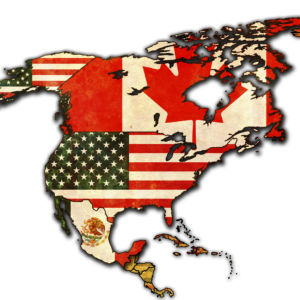Editor’s Note: For an alternative viewpoint, please see: Point: NAFTA’s Good but Could Be Better
It’s hard to see where the Trump administration’s renegotiation of the North American Free Trade Agreement is going, but we do know what a “good” trade deal, one that benefits working people and their communities, should look like.
For millions of working families, NAFTA has meant lost jobs, closed factories and call centers, and lower wages, with most unable to find jobs that provide similar levels of pay and benefits. For communities, it’s meant a loss of important public services and cuts in education and other programs as employers abandon cities and towns to relocate out of the country.
The 200,000 U.S. jobs NAFTA was supposed to create each year never materialized, because companies preferred to set up factories where they could pay poverty wages and pollute air and water without any real risk of penalty.
Now, nearly 25 years later, Mexican workers continue to labor for pennies a day and companies face virtually no penalties for environmental pollution. Weak U.S. labor laws prompted Canada to put forward a proposal that calls for a ban on so-called “right-to-work” laws. These laws have nothing to do with providing a right to a job but instead are about weakening the ability of working people to negotiate for fair wages, benefits and working conditions.
Right now, rather than proposing strong labor and environmental provisions that would actually raise wages and standards for workers in all three countries, the U.S. plan includes the same failed labor and environmental provisions included in the rejected Trans-Pacific Partnership and other deals. That means that labor violations — like wage theft, excessive forced overtime and even child labor violations — can’t be addressed unless they are both “sustained and recurring” and committed “in a manner affecting trade,” an impossible standard to meet.
Here’s what a better NAFTA looks like:
—It eliminates the incentives that corporations now have to send jobs offshore. Current trade deals give special protections to multinational corporations operating overseas and enable them to pay wages that are a fraction of U.S. wages. Millions of U.S. manufacturing and service-sector jobs, including call centers and information technology, have been lost as companies look for places to pay the lowest wages.
—In particular, it eliminates the Investor-State Dispute Settlement process. ISDS allows foreign investors and multinationals to challenge local, state and federal laws before a private panel of corporate lawyers. The private panel decides if a corporation’s “expected future profits” would be harmed by the government action being challenged, and if so, the panel assesses its often multi-million-dollar fines against the government. Decisions can’t be appealed. The game is rigged. This system needs to be scrapped to make sure that corporate rights don’t have more priority than citizens’ rights.
—It strengthens the side treaties on labor and environment and includes them as part of the overall agreement. International labor standards covering workers’ rights to unionize, the prohibition of child labor and requirements for fair pay must be enforced, not ignored. Weak protections for workers and the environment that aren’t enforced will not get the job done — we need strong protections and the same enforcement mechanisms available for others, including investors.
—It takes action on currency manipulation and creates binding rules that can be enforced with sanctions when necessary. Mexico devalued its currency to make imports from Mexico far cheaper than they would have been. China, Japan and other countries have engaged in currency manipulation for years, hurting U.S. workers. That must stop. The Trump plan mentions currency manipulation, but doesn’t lay out any specifics on how we would put an end to this harmful cheating.
—It makes certain that “Buy American” means something, and actually benefits U.S. workers and communities. “Buy American” policies encourage taxpayer-funded U.S. government contracts to be awarded to U.S. workers and businesses. NAFTA created loopholes in these requirements, allowing many Mexican and Canadian products to be considered equivalent to U.S. products. An ideal renegotiated NAFTA ends this double standard.
—It reverses current provisions that drive up the costs of medicine in the United States by giving big pharmaceutical firms monopoly protections. That means years of delay in the development of generic drugs that ordinary people in all three countries can afford. We must reverse current policy that undermines food safety by classifying meat and other food from NAFTA partners as “equivalent” to U.S. standards, even though the products haven’t gone through our food inspection process.
This is the kind of trade deal that working families can support.

